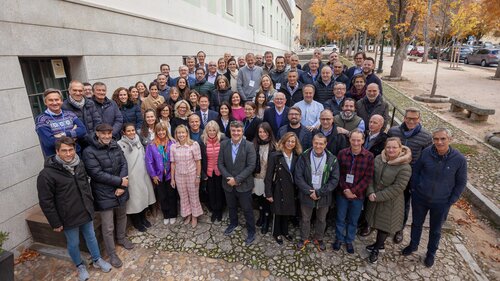![]()
14 November 2024
Fit for the future: rethinking education in periodontology
Categories:Education, Publications

The consensus report of the second European consensus workshop on education in periodontology has just been published in the Journal of Clinical Periodontology.
“We believe the consensus report will shape the contents, learning outcomes, methods of learning and of evaluation, adopted by universities in Europe and also globally,” said David Herrera, chair of Perio Workshop 2023 and first author of the publication. “It will have a significant impact on how periodontology and dental implant treatments are taught at different levels: undergraduate, continuing education including vocational education and training (VET), and training at the specialist level. The latter is especially important for the EFP-accredited postgraduate programmes in periodontology and implant dentistry, offered by universities across Europe, the Middle East, and the Asia-Pacific region.”
The workshop in 2023 brought together 70 leading international experts from 22 countries in La Granja de San Ildefonso, Spain. The purpose of the gathering was to discuss and establish a new consensus on undergraduate, specialist training, and continuing education in periodontology. Changes in the discipline (such as those brought about by the 2018 classification of periodontal and peri implant diseases, or the publication of different clinical practice guidelines developed by the EFP) and advances in educational methods and technologies (such as the development of new tools accelerated by the COVID-19 pandemic) made it necessary to update the previous workshop from 2009.
The meeting drew experts not only from the European Federation of Periodontology but also from the Association for Dental Education in Europe (ADEE). Participants were organised into four working groups, focusing on various aspects of periodontal education:
- Undergraduate dental education in periodontology
- Specialist training
- Continuing education
- Education methods
Each group reviewed learning outcomes, competences, and methods of learning, training and evaluation for each level of education, including face to face, virtual and blended learning methods.
In undergraduate education, a revised set of learning outcomes is presented, following the new framework proposed by the ADEE, and the need to move from traditional competences to learning outcomes.
In specialist training, learning outcomes/competences were also updated using the experience of EFP accredited programmes, as well as the feedback from surveys for graduates and programme directors. In addition, methods of teaching and evaluation, and the need for quality assurance are discussed in the consensus.
In the ever-evolving landscape of dental education, the importance of continuing professional development for dental professionals cannot be overstated. To maintain, update, and broaden professional knowledge and skills, innovative educational pathways in periodontology and implant dentistry are explored in the publication.
For educational methods, modern educational theory emphasises a circular relationship between teaching and learning, with the quality of teaching determining the ability to learn. In the digital era, particularly for Generation Z students, the sheer volume of available information has led to a shift towards 'soundbite' learning. This calls for innovation and modernisation of traditional didactic methods.
The consensus discusses blended learning - a concept that optimally combines traditional face-to-face and virtual learning methods. This approach addresses the unique challenges of oral healthcare education, which requires not only the development of critical thinking skills and basic knowledge application, but also the acquisition of clinical, social, professional, and practical skills.
While traditional face-to-face models offer a valuable social environment and opportunities for interaction, virtual education provides cost-effectiveness, access to a wider range of expertise, flexible scheduling, and accommodation of different learning preferences. The use of artificial intelligence (AI) in education is also on the rise, with educators advised to guide students on its appropriate use.
However, the implementation of virtual educational technologies in periodontal education presents challenges and requires careful consideration before widespread adoption. Academic institutions are encouraged to address barriers and to train teachers in virtual and student-centred methods.
The consensus publication indicates that while face-to-face teaching will continue to be highly valued, it can be enhanced by using student-centred methods and well-balanced blended approaches. The key lies in finding the right balance between tradition and innovation.
Professor Moritz Kebschull, EFP president and co-author of the publication, highlighted vocational education and training (VET) as an important section of the report: « The consensus puts a strong emphasis on VET as a third pillar between undergraduate and specialist postgraduate education. It is a requirement for every oral health professional to maintain, update and broaden their professional standards through vocational education and trainingprogrammes, to improve patient care.”
Vocational education and training, an initiative under the European Commission, focuses on professional development through a structured modular process of work-based learning, contributing significantly to the formation of a professional identity and boosting learner confidence. Governed by the Bruges-Copenhagen process (which complements the Bologna process for university-based primary education) VET programmes are increasingly structured into smaller modules or units. Evidence suggests that several countries have adopted more flexible approaches, allowing learners to accumulate smaller parts of qualifications assessed separately. These programmes should incorporate interactive processes such as audit and feedback of clinical application and comply with the current European regulatory framework.
Perio Workshop 2023 was sponsored by Dentaid. The company collaborates with dentists, hygienists, pharmacists, and general health professionals to promote the oral health ecosystem that allows for advances in oral health research, professional training and provides the best solutions for each individual. Joan Gispert, Dentaid, R&D director, declared: “We are proud to have contributed to the advancement of the training of periodontists through our collaboration in this workshop. This partnership is fully aligned with one of our corporate pillars, which is the generation of scientific knowledge and the training of professionals. We will continue down this path to improve the oral health ecosystem for the benefit of patients.”
Kebschull concluded: “The new consensus document underscores the EFP’s dedication to leading the way in education, guaranteeing that the training of aspiring periodontists and dental professionals aligns with the most recent breakthroughs in both periodontology and education.”




